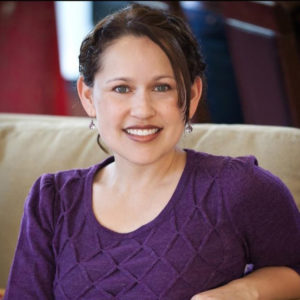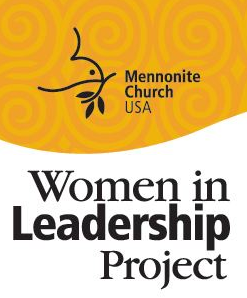 Maribel Ramírez Hinojosa is a clinical psychologist in College Station, Texas. She was born in Nuevo León, México, and immigrated to central California in the 1980s where she and her family joined a Mennonite church. Her Anabaptist upbringing and her training as a marriage and family therapist and clinical psychologist were instrumental in developing her passion for peace and justice. Maribel works with children, couples and families with varying mental health issues. Her goal is to help patients achieve a better state of being in order to arrive at an improved state of functioning. Maribel enjoys volunteering with Mennonite organizations and with organizations that promote music and the arts. She and her husband Felipe have two children, Samuel and Ariana, who keep them very busy. They enjoy traveling, dancing and laughing together. Maribel is a member of the steering committee for the Women in Leadership Project of Mennonite Church USA.
Maribel Ramírez Hinojosa is a clinical psychologist in College Station, Texas. She was born in Nuevo León, México, and immigrated to central California in the 1980s where she and her family joined a Mennonite church. Her Anabaptist upbringing and her training as a marriage and family therapist and clinical psychologist were instrumental in developing her passion for peace and justice. Maribel works with children, couples and families with varying mental health issues. Her goal is to help patients achieve a better state of being in order to arrive at an improved state of functioning. Maribel enjoys volunteering with Mennonite organizations and with organizations that promote music and the arts. She and her husband Felipe have two children, Samuel and Ariana, who keep them very busy. They enjoy traveling, dancing and laughing together. Maribel is a member of the steering committee for the Women in Leadership Project of Mennonite Church USA.
I am one of three sisters, and when I was around 13 years old, I remember asking my father what he thought about having had only daughters. He said that he was fine with it, but he did remember feeling sadness because, “Las mujeres sufren más que los hombres,” (women suffer more than men). I grew up in a peaceful home and never witnessed or heard of domestic violence. I also had many examples of strong women, starting with my mother, who seemed to run our household and do it well. I asked my father what he meant by that, and he went on to tell me that many women live at the mercy of men and that we, as his daughters, did not have to be that way.
He taught me and my sisters that we should never depend on a man and that we should educate ourselves and make sure that we were self-sufficient.
My father, a very gentle and soft-spoken man, then used a word that I had never heard him use before or since. I can’t repeat it, because I don’t use that type of language, but he used that word in lieu of “men” when he said something like this: There will always be men and you won’t have to go far to find one, but you should never feel as if you have to depend on one. As time went on, I began to see sexism all around me, even in my own family. And because a lot of it is tied to specific customs that are entrenched in my culture, I easily fall into it sometimes, particularly when I am in certain settings. In my home, both my husband and I cook, clean, co-parent, etc., but when I am visiting my family in Mexico, my husband sits outside with the men talking. Meanwhile we women are inside cooking, cleaning and attending to the children.
My husband is an ally and feminist himself. It was clear from the beginning that we would raise children who were conscientious and not afraid of reaching their full potential. We try to model for our children a partnership that is supportive and uplifting, and we are not afraid to talk to our children about injustices in age appropriate ways, so that they can learn to combat them. After this last presidential election, we realized that we had to be even more intentional. After the election, we heard at church that a girl was approached in school by two male peers who told her that they could now grab her p—-y because Donald Trump was elected president. Besides having to explain to our children what that word meant, we talked to them about sexism and the many forms that it can take.
 My husband and I made sure that we continued to openly talk about this topic. Our family participated in the Women’s March this past January, and we began to read a book entitled, “Rad Women Worldwide: Artists and Athletes, Pirates and Punks, and other Revolutionaries who Shaped History,” written by Kate Schatz and Miriam Klein Stahl. Every night, we read to our children one of 40 biographical profiles as part of our bedtime routine. Both of my children, my son and daughter, are very intrigued by the stories and always ask many questions.
My husband and I made sure that we continued to openly talk about this topic. Our family participated in the Women’s March this past January, and we began to read a book entitled, “Rad Women Worldwide: Artists and Athletes, Pirates and Punks, and other Revolutionaries who Shaped History,” written by Kate Schatz and Miriam Klein Stahl. Every night, we read to our children one of 40 biographical profiles as part of our bedtime routine. Both of my children, my son and daughter, are very intrigued by the stories and always ask many questions.
This summer, as they do every summer, they participated in Peace Camp Houston. During Peace Camp, they learn ways of bringing about inner and outer peace. They are taught ways of dealing with injustice so that everyone can experience peace. One of the topics addressed this year was sexism. Everyday after camp, the children would tell us about their day and what they learned. On that day, my son said, with tears in his eyes, that while he understood what the speaker was saying, he also felt sad and confused, because maybe it was bad to be a boy. My heart broke, because communicating that message was not our intention, nor did we ever value/devalue one gender over another.
We validated our son’s feelings and it was interesting and sweet to see how his nine-year-old sister tried to comfort him. While my son is a kind child who tries to be fair and understand the importance of gender equality, he was still born into a world that favors his gender.
My daughter, savvy young girl that she is, explained to him the privilege and responsibility of being born a boy.
Being born male isn’t bad. My son is a child of God who is created in God’s image; being born a boy simply means that he also has a responsibility to be an ally to women. My son appeared to feel heard and seemed to have a greater understanding of sexism on the car ride home.
Raising children who care about peace and justice for all, but in this case specifically for women, isn’t easy. I’m not sure if there is a perfect way of doing it, but as Christians, not doing it at all is not an option.
I think that it is easier when parents create a space for open communication in which the different family members can share vulnerable thoughts and feelings. It is an honor and a humbling experience to parent my son and daughter. Needless to say, I am proud of them both and I’m excited to see what God has in store for them.

